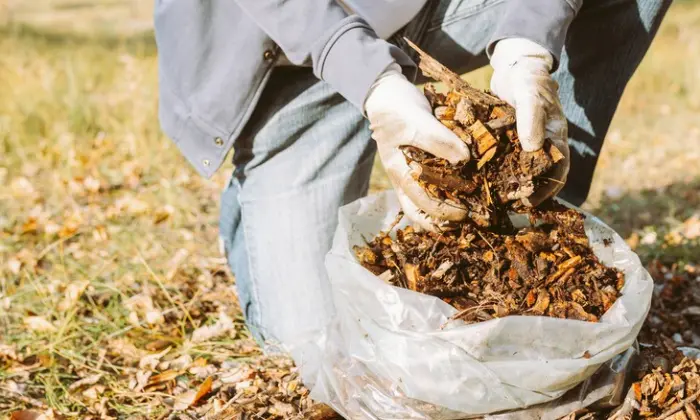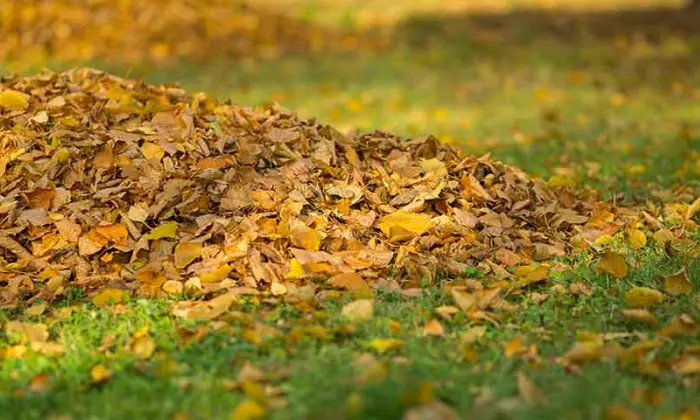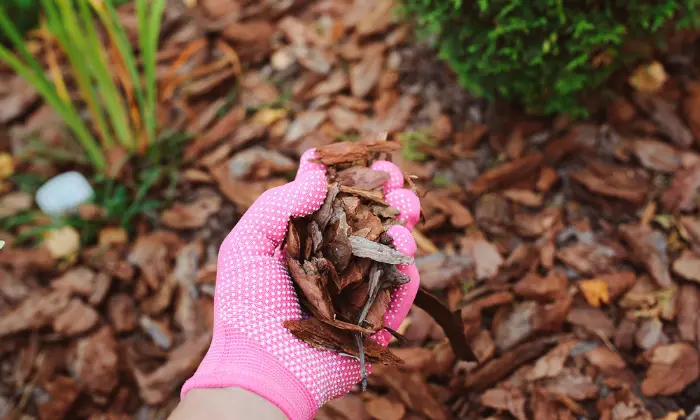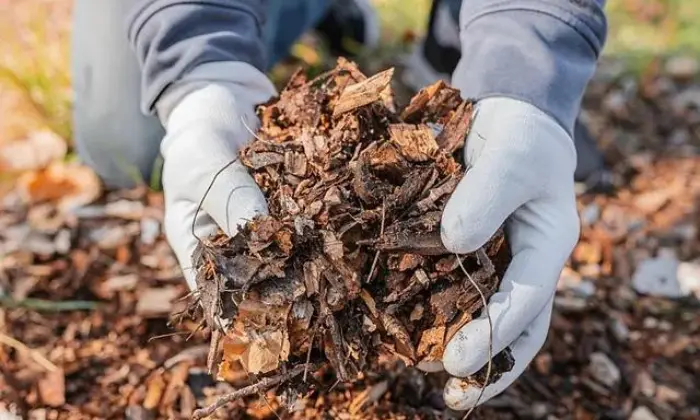Mulching is a crucial practice in gardening and landscaping, providing numerous benefits such as weed suppression, moisture retention, and soil insulation. However, to reap these advantages, it’s essential to store mulch properly, especially during the winter months. In this guide, we’ll delve into the meticulous details of how to store mulch efficiently, with a focus on different scenarios, including mulch leaves and bagged mulch. Trust Robert’s Complete Care to bring you expert advice for optimal mulch storage.
How To Store Mulch
How to store mulch effectively, is essential to follow a few simple steps. First, ensure that the mulch is kept in a cool and dry environment to prevent mold or decay. Use a sturdy and breathable container, such as a plastic or metal bin with ventilation holes, to allow air circulation and prevent the mulch from becoming too compact. Additionally, keep the storage area away from direct sunlight to maintain the mulch’s moisture content. By taking these precautions, you can preserve the quality of your mulch, enhancing soil health and promoting plant growth.

How To Store Mulch Bags
Storing mulch properly is essential to maintain its effectiveness in enhancing soil health and promoting plant growth. To store mulch effectively, choose a cool, dry location, such as a shed or garage, to prevent moisture accumulation. Elevate mulch bags off the ground on pallets or shelves to ensure air circulation and deter pests. Seal bags tightly or use airtight containers to protect mulch from exposure to air and moisture. When it comes to bagged mulch, ensuring its longevity and effectiveness starts with proper storage. Follow these steps to preserve the quality of your mulch bags:
Choose a Dry Storage Location
Option for a cool, dry place to store your mulch bags. A shed or garage is ideal, as it protects the bags from excess moisture.
Elevate the Bags
To prevent water damage, elevate the mulch bags off the ground. Pallets or shelves can help maintain air circulation and deter pests.
Seal the Bags
Use airtight containers or secure the bags tightly to prevent exposure to air and moisture, maintaining the freshness of the mulch.

How To Store Mulch Leaves
Storing mulched leaves efficiently involves a straightforward process to preserve their quality for future use. First, gather the fallen leaves and ensure they are dry to prevent mold formation during storage. Once collected, create a dedicated space in your yard or garden for the leaves. Consider using breathable containers, such as large plastic bags with ventilation holes, or construct a compost bin. Layer the leaves in the container, and if possible, add a thin layer of soil or compost between each leaf layer. Mulching with leaves is an excellent way to recycle and nourish your garden soil. Properly storing mulched leaves ensures they remain valuable for your landscaping needs:
Create Leaf Compost Bins
Designate specific bins for your mulched leaves. These can be simple wire mesh bins or designated areas in your garden.
Turn the Leaves
Periodically turn the leaves within the bins to promote even decomposition and prevent matting, which can inhibit airflow.

How To Store Mulch Over The Winter
How to store mulch over the winter, it’s essential to protect it from harsh weather conditions to ensure its effectiveness in the upcoming gardening season. Begin by creating a designated storage area in a dry and well-ventilated space, such as a garage or shed. If storing mulch in bags, ensure they are tightly sealed to prevent moisture infiltration. Alternatively, if you have a bulk pile of mulch, cover it with a tarp or plastic sheeting to shield it from snow and rain. This safeguards the mulch from excessive moisture, preventing mold or decay. Ensure your mulch is well-protected during the colder months to maintain its effectiveness:
Apply Mulch Before Winter
Spread mulch around your plants before winter sets in. This provides insulation and protects the roots from freezing temperatures.
Store Extra Mulch Properly
If you have excess mulch, store it in bags or bins following the guidelines mentioned earlier. Ensure it’s readily available for any touch-ups during the winter season.
Monitor Moisture Levels
Check stored mulch regularly for moisture levels. Excessive moisture can lead to mold and decay, diminishing the quality of the mulch.
Conclusion
Effective mulch storage is key to maximizing its benefits in your garden or landscaping projects. By following these guidelines from Robert’s Complete Care, you can preserve the quality of bagged mulch, and mulched leaves, and ensure your winter mulching efforts are successful. Remember, proper storage not only extends the lifespan of your mulch but also contributes to healthier, more vibrant plants and soil. Connect with us for top-notch service and care Contact Us.
FAQS
How Should I Store Bagged Mulch To Maintain Its Freshness?
To preserve bagged mulch, store it in a cool, dry location such as a shed or garage. Elevate the bags off the ground, seal them airtight to prevent exposure to air and moisture, and protect them from pests.
Can I Use Any Container For Storing Mulched Leaves, Or Are Specific Bins Recommended?
While you can use various containers for mulched leaves, it’s recommended to designate specific bins for this purpose. Wire mesh bins or designated areas in your garden work well. Turning the leaves periodically and covering the bins during winter enhances their effectiveness.
How Do I Store Mulched Leaves Over The Winter?
For winter storage, cover the leaf compost bins with a tarp or burlap to shield them from harsh weather conditions. Ensure proper aeration and periodically turn the leaves to promote even decomposition.
Can I Apply Mulch During The Winter, And How Should I Store Extra Mulch For Winter Use?
Yes, you can apply mulch before winter to provide insulation for plants. Store extra mulch in bags or bins following recommended guidelines to keep it readily available for any touch-ups during the winter season.
Should I Be Concerned About Moisture Levels When Storing Mulch?
Yes, it’s essential to monitor moisture levels when storing mulch. Excessive moisture can lead to mold and decay, affecting the quality of the mulch. Regular checks ensure that your stored mulch remains in optimal condition.


